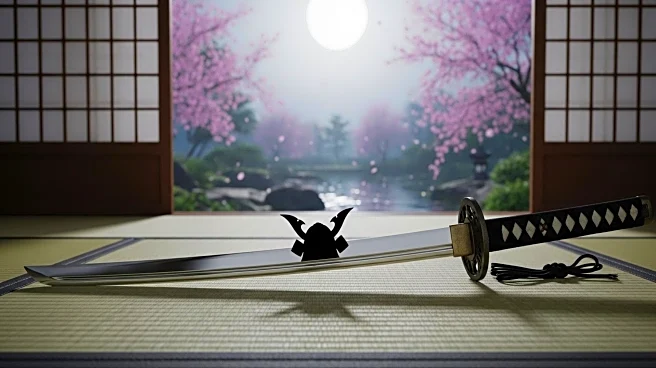What's Happening?
Sucker Punch Productions has released 'Ghost of Yotei,' a sequel to the popular 'Ghost of Tsushima,' set in 1600s Hokkaido, Japan. The game allows players to experience the role of a vengeful mercenary. It features optional modes inspired by Japanese film directors Akira Kurosawa, Takashi Miike, and Shinichirō Watanabe. The Kurosawa mode, developed in collaboration with the Kurosawa estate, offers a black-and-white visual style with enhanced environmental effects. The game also includes a mode inspired by Miike's '13 Assassins,' focusing on intimate and personal combat experiences. Additionally, Watanabe's influence is seen in a unique audio mode that incorporates lo-fi beats, reminiscent of his work on 'Samurai Champloo.'
Why It's Important?
The release of 'Ghost of Yotei' highlights the growing trend of video games drawing inspiration from cinematic sources, offering players a more immersive and culturally rich experience. By collaborating with renowned filmmakers, Sucker Punch Productions not only pays homage to classic samurai cinema but also broadens the appeal of the game to fans of these directors. This approach may influence future game developments, encouraging more studios to integrate filmic elements into their storytelling. The game's cultural sensitivity and collaboration with Japanese experts also underscore the importance of authenticity in representing historical and cultural narratives in gaming.
What's Next?
As 'Ghost of Yotei' reaches players, feedback will likely focus on the effectiveness of its cinematic modes and cultural representation. The success of these features could lead to further collaborations between game developers and filmmakers, potentially setting a new standard for narrative-driven games. Additionally, the game's reception may influence Sucker Punch Productions' future projects, encouraging them to continue exploring historical and cultural themes with similar depth and authenticity.
Beyond the Headlines
The development of 'Ghost of Yotei' raises important questions about cultural representation in media. By involving cultural experts and focusing on historical accuracy, the game sets a precedent for how studios can approach sensitive topics. This could lead to broader discussions within the industry about the responsibilities of game developers in portraying diverse cultures and histories. Furthermore, the game's success might inspire other studios to explore underrepresented narratives, contributing to a more inclusive gaming landscape.










